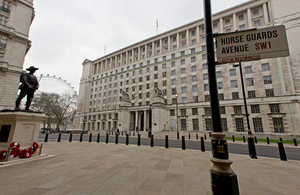FPDA Defence Ministers’ joint statement
Press release
Defence Ministers from Australia, Malaysia, New Zealand, Singapore and United Kingdom reaffirmed their nations’ continued commitment to the Five Power Defence Arrangements (FPDA).

-
The Defence Ministers from Australia, Malaysia, New Zealand, Singapore and United Kingdom reaffirmed their nations’ continued commitment to the Five Power Defence Arrangements (FPDA), and commended the achievements over the past 49 years as the FPDA moves towards its 50th Anniversary in 2021.
-
The Ministers recognised the FPDA’s significant role and contribution in promoting cooperative responses to an increasingly complex contemporary security environment.
-
The Ministers extended their deepest sympathies to the countries, communities and individuals impacted by the COVID-19 pandemic, and noted the effective measures undertaken by FPDA nations’ in dealing with the pandemic and ensuring the well-being of their people, economic development as well as regional security and stability.
-
Assuring the resilience of the FPDA amidst these difficult times, the Ministers commended the FPDA Consultative Council (FCC), the FPDA Policy Group (FPG) and the FPDA Activities Coordinating Committee (FACC) leaders for their adaptability in utilising alternative platforms to ensure continuity in decision-making processes amidst the COVID-19 pandemic.
-
The Ministers welcomed the growth in scope and depth of the FPDA over the last 49 years, which has evolved to introduce elements of humanitarian assistance and disaster relief, counter-terrorism and maritime security into FPDA exercises and discussions whilst retaining its core focus on conventional warfare. This development has enabled FPDA to retain its relevance in an increasingly complex contemporary security environment.
-
The Ministers reaffirmed their commitment to the FPDA’s founding principles: to remain relevant and defensive in nature, and evolve at a ‘pace comfortable to all’. Complementing these founding principles, the “3Rs” principles of adhering to the FPDA’s Remit, maintaining Relevance and providing Reassurance to the region are cardinal in guiding the FPDA’s future outlook.
-
The Ministers appreciated the extensive effort by the members in planning and organising the FPDA activities despite the cancellation of exercises due to the pandemic situation. The Ministers also recognised the significant value that these activities offer, in enhancing cooperation on conventional military operations, building trust and confidence, developing greater people-to-people links and fostering interoperability between member nations’ armed forces.
-
The Ministers looked forward to marking the celebration of the FPDA’s 50thAnniversary in 2021. The Ministers agreed that the celebrations would showcase the FPDA’s integrated capability, commitment to transparency, and continued evolution to remain a relevant and trusted mainstay of regional security architecture.
Published 27 November 2020



